Are you ready to give your startup the marketing boost it needs to thrive in today’s competitive environment?
With our expertly crafted marketing strategies, we can help you establish a solid brand image, reach your target audience, and grow your business exponentially.
Startups rely heavily on marketing to develop their brand identity, connect with prospective customers, and expand their operations. A successful marketing plan demands well-defined goals, identification of a key demographic, competitive evaluation, a distinctive value offering, and appropriate channels and tactics. Startups are advised to leverage social media, content marketing, email marketing, SEO, influencer, and affiliate marketing to interact with and captivate their audience. Effective marketing transcends mere selling and involves narrating a compelling story that resonates with customers, resulting in enduring growth and viability.
Table of Contents
- Introduction: Understanding the Importance of Marketing for Startups
- The Key Elements of a Successful Startup Marketing Strategy
- Identifying Your Target Market: The First Step To Success
- Building a Unique and Powerful Brand Image for Your Startup
- The Power of Social Media in Startup Marketing
- Content Marketing: A Must-Have Strategy for Every Startup
- Utilizing Email Marketing to Reach and Retain Customers
- The Role of SEO in Boosting Your Online Presence
- Leveraging Influencer and Affiliate Marketing for Greater Exposure
- Final Thoughts: Implementing These Strategies for Your Startup’s Success
Introduction: Understanding the Importance of Marketing for Startups
Marketing is the lifeline of any business, especially startups. In an era marked by rapid technological advancements and intense competition, having a great product or service alone isn’t enough to guarantee success. Marketing helps startups establish their brand image, reach potential customers, and ultimately grow their business.
A well-crafted marketing strategy can make a significant difference in a startup’s journey. Not only does it aid in creating awareness about your products or services, but it also helps in understanding customer behavior and preferences better. This understanding allows businesses to tailor their offerings accordingly and carve out a niche for themselves in the market.
According to CB Insights, 42% of startups fail because they don’t meet a market need. In other words, they lack effective marketing strategies that would have enabled them to identify potential customers and meet their demands effectively. “Your culture is your brand,” says Tony Hsieh, former CEO at Zappos.com Inc., emphasizing that building strong connections with customers is crucial for long-term success. This connection comes from effective marketing efforts.
The Key Elements of a Successful Startup Marketing Strategy
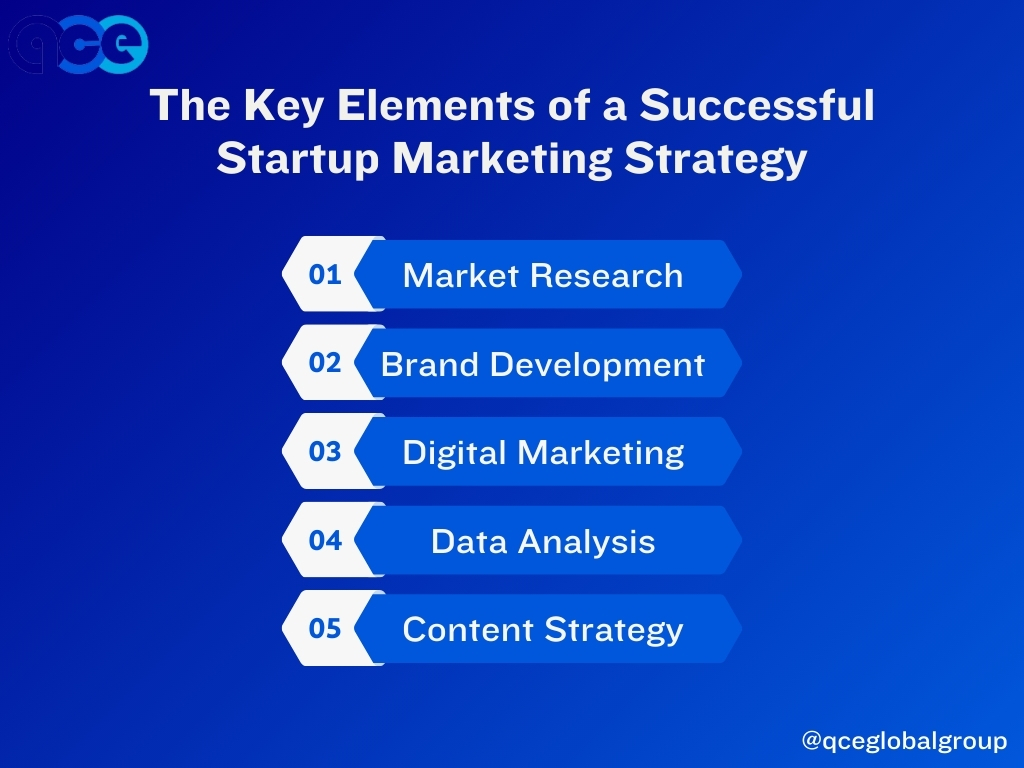
A successful startup marketing strategy includes several key elements. First, an understanding of the target audience is necessary, including their needs, behaviors, and how your product can meet those needs. Second, a unique value proposition that sets your startup apart from competitors is crucial. Third, consistent and engaging branding that resonates with the audience is essential for recognition. Fourth, using digital marketing channels like social media, email marketing, SEO, content marketing, and paid ads can increase visibility and reach. Finally, regular analysis and adjustments based on market response and trends are needed to keep the strategy relevant and effective.
- Market Research: Conducting thorough market research to gather data about the target audience, their needs, preferences, and pain points. This will help in developing a product or service that fulfills their needs.
- Unique Value Proposition: Identifying a unique value proposition that differentiates the startup from its competitors. This should be a clear statement that explains how the startup’s product or service solves customers’ problems or improves their situation.
- Brand Development: Creating a strong, consistent brand that resonates with the target audience. This includes everything from the logo and color scheme to the tone of voice used in marketing materials.
- Digital Marketing: Utilizing various digital marketing channels such as social media, email marketing, SEO, content marketing, and paid ads to increase visibility and reach.
- Data Analysis: Regularly analyzing data to measure the success of marketing efforts and making necessary adjustments. This could include tracking website traffic, social media engagement, email open rates, and other key performance indicators (KPIs).
- Customer Engagement: Building a strong relationship with customers through engaging content, responsive customer service, and regular interaction on social media.
- Partnerships and Collaborations: Forming strategic partnerships or collaborations with other businesses can help to increase visibility and reach a wider audience.
- Content Strategy: Developing a content strategy that provides valuable, relevant, and consistent content to attract and retain a clearly defined audience.
- PR and Media Relations: Utilizing PR and media relations to gain coverage in relevant publications, enhancing credibility and increasing brand awareness.
- Continuous Learning and Adaptation: Staying up-to-date with the latest marketing trends and techniques, and being willing to adapt the marketing strategy in response to changes in the market or customer behavior.
Identifying Your Target Market: The First Step To Success
Identifying your target market forms the cornerstone of any successful marketing strategy. Having a well-defined target audience allows you to focus your marketing efforts on those who are most likely to buy your product or service, thereby maximizing ROI. Start by defining demographic characteristics like age, gender, location, income level, etc. Then move onto psychographic factors like interests, values, and lifestyle.
For instance, if you’re targeting millennials with disposable income & an active social life – positioning a high-end cocktail mix could be a potential success.
Here are the 10 Steps to Identifying Your Target Market for Business Success:
- Conduct Market Research: Market research will give you valuable insights into who your potential customers are and what they want. You can do this by conducting surveys, interviews, or focus groups.
- Use Customer Personas: Develop customer personas that reflect the characteristics of your ideal customer. This will help you understand their needs, wants, and behaviors better.
- Analyze Your Competitors: Look at who your competitors are targeting and how they are positioning their products or services.
- Use Social Media: Social media platforms like Facebook and Instagram provide detailed data on their users. You can use this data to identify who your target market is.
- Test Different Markets: Don’t be afraid to test different markets. You may find that a market you hadn’t considered is actually a good fit for your product or service.
- Look at Your Current Customer Base: Analyzing your current customers can give you valuable insights into who your target market should be.
- Consider Lifestyle Preferences: Lifestyle preferences, such as how people spend their leisure time or what kind of food they like, can also help you identify your target market.
- Study Industry Trends: Industry trends can give you an idea of where the market is headed and who the up-and-coming target markets are.
- Use Geographic Segmentation: If your product or service is location-specific, consider using geographic segmentation to identify your target market.
- Evaluate Buying Patterns: Studying the buying patterns of different demographics can help you identify who is most likely to purchase your product or service.
Building a Unique and Powerful Brand Image for Your Startup
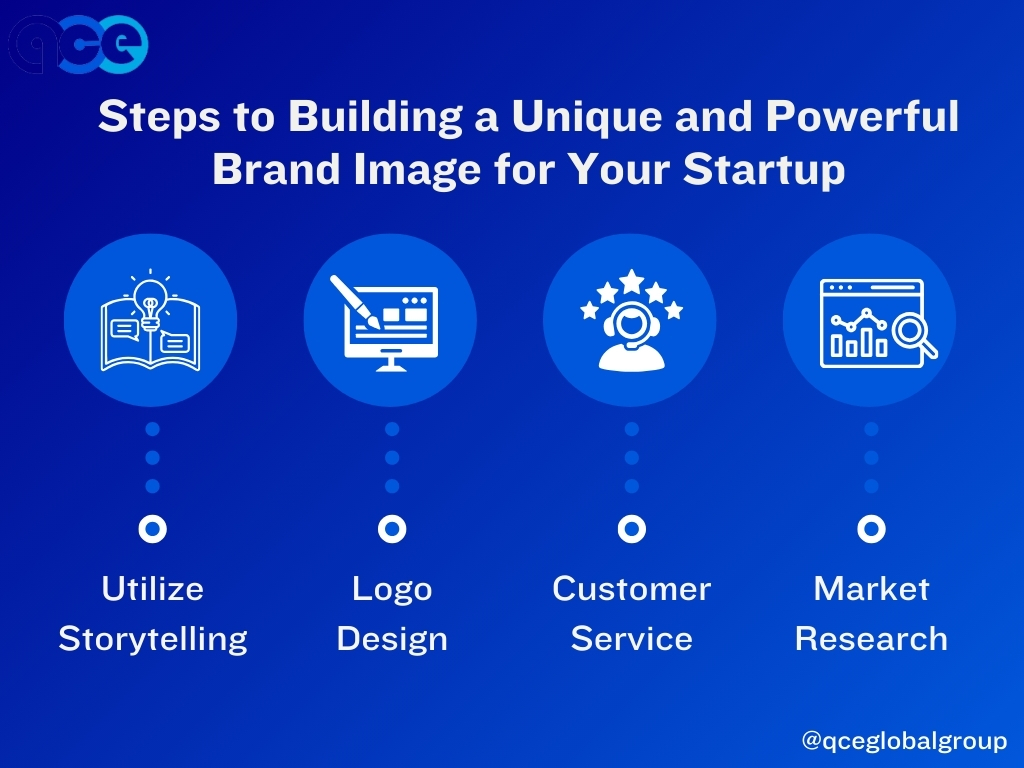
Creating a unique and strong brand image is key to startup success. Beyond just a logo or tagline, a brand embodies the company’s mission and core values. It’s crucial to consistently and coherently express these across all consumer touchpoints, such as social media, customer service, and product packaging. Authenticity is also important, as modern consumers prefer transparent and genuine businesses that align with their values. An authentic and unique brand builds consumer trust and can offer a competitive advantage.
Here are the 10 Steps to Building a Unique and Powerful Brand Image for Your Startup:
- Storytelling: Create a compelling and authentic story that showcases the startup’s journey, mission, and values. This can be shared on the company’s website, social media, and in marketing materials.
- Logo Design: Design a unique and memorable logo that represents the company’s brand identity. Ensure it is versatile enough to be used across various platforms.
- Social Media Presence: Utilize social media platforms to engage with consumers and showcase the brand’s personality. Regularly update content and interact with followers to build a loyal community.
- Transparent Communication: Be transparent in all communications, be it with customers, employees, or stakeholders. This helps to build trust and demonstrate the authenticity of the business.
- Quality Products and Services: Ensure that all products or services offered by the startup align with the brand image. Quality should never be compromised, as it is a direct reflection of the brand.
- Consistent Messaging: Ensure that all marketing and communication efforts project a consistent brand message. This includes tone, language, and visuals used in promotional materials.
- Employee Advocacy: Encourage employees to be brand ambassadors. They can help promote the brand on their personal social media channels and in their personal networks.
- CSR Initiatives: Engage in corporate social responsibility initiatives that align with the brand’s values. This not only enhances the brand image but also shows commitment to social causes.
- Customer Service: Provide exceptional customer service, as this directly reflects on the brand. Satisfied customers can become loyal brand advocates, promoting the brand through word-of-mouth.
- Market Research: Regularly conduct market research to understand consumer needs and preferences. This information can be used to align the brand image with consumer expectations, thus strengthening the brand’s positioning in the market.
The Power of Social Media in Startup Marketing
Social media has become a crucial tool for startup marketing in the digital age. Platforms like Facebook and Instagram offer direct communication channels with customers, allowing startups to reach a broader audience and encourage interactive experiences through likes, shares, comments, and direct messages. This open dialogue helps foster stronger relationships with customers and provides valuable feedback for startups to understand their audience better and adjust their strategies. Therefore, social media serves not just as a marketing tool, but also as a key element of customer relationship management for startups.
Here are the 10 Ways Social Media Empowers Startup Marketing:
- Customer Engagement: Social media platforms provide the perfect space for startups to engage with their customers in real-time, generating more meaningful interactions and fostering customer loyalty.
- Brand Awareness: With millions of users worldwide, social media is an excellent platform for startups to increase their visibility and build brand awareness on a global scale.
- Content Sharing: Startups can utilize social media to share compelling content related to their products or services, which can increase their reach and attract potential customers.
- Cost-Efficient Advertising: Social media advertising is relatively affordable compared to traditional advertising methods, making it an ideal tool for startups with limited marketing budgets.
- Market Research: Social media platforms allow startups to gather insights about their target audience’s interests, behavior, and demographics, aiding in the development of more effective marketing strategies.
- Customer Service: Social media platforms provide an accessible channel for startups to address customer queries and complaints promptly, enhancing customer satisfaction.
- Influencer Marketing: Partnering with social media influencers can help startups reach larger audiences and gain credibility in their industry.
- Viral Marketing: Startups can leverage the power of viral marketing on social media, which can exponentially increase their visibility and customer base.
- User-Generated Content: Startups can encourage customers to share their experiences with the brand on social media, providing authentic content that can attract potential customers.
- Community Building: Social media platforms enable startups to build and nurture an online community of loyal customers, which can boost brand advocacy and long-term growth.
Content Marketing: A Must-Have Strategy for Every Startup
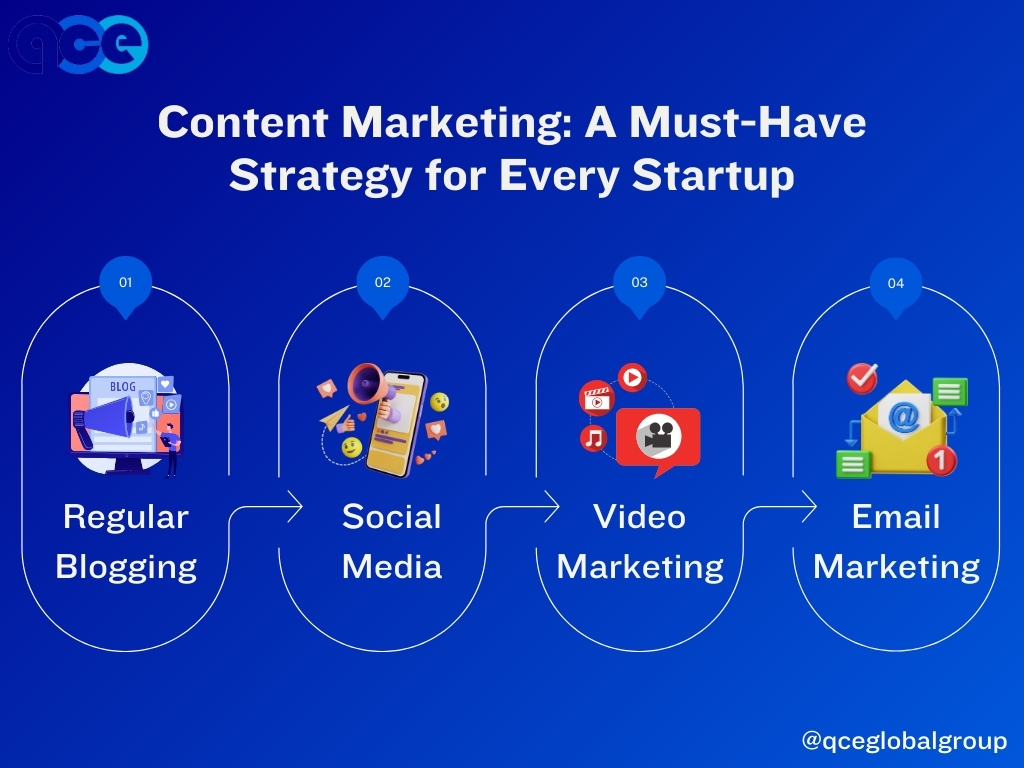
Content marketing is an essential strategy for every startup as it not only helps in attracting consumer attention but also in boosting consumer engagement and driving customer action. It is a potent tool for narrating your brand’s story effectively, building a trustworthy relationship with customers, and positioning your brand as an industry expert. Creating high-quality, valuable content can help startups reach their target audience, generate leads, and eventually convert them into loyal customers. Therefore, content marketing is not just desirable, but a must-have strategy for every startup aiming for sustainable growth and success.
Here are the Top 10 Content Marketing Strategies for Startups:
- Blogging: Regular blogs can provide valuable insights into your startup’s products/services, industry trends, or even success stories. It helps in driving organic traffic to the website and improves SEO.
- E-books and Whitepapers: Publishing in-depth, research-based content like e-books and whitepapers can establish your startup as a thought leader in the industry.
- Social Media Content: Social media is a powerful platform to share your brand story, engage with consumers, and get real-time feedback.
- Video Marketing: Videos are engaging and can be used to explain complex ideas simply. They can be used for product demos, customer testimonials, or even behind-the-scenes glimpses.
- Infographics: Infographics are visual content that can simplify complex data or information. They are shareable and can boost your brand visibility.
- Podcasts: Podcasts have gained popularity recently. They can be used to share industry insights, interview industry experts or discuss trending topics.
- Email Marketing: Personalized emails can help in nurturing leads, announcing new products/services, or sharing exclusive deals.
- Webinars: Hosting webinars can provide value to your audience while showcasing your startup’s expertise.
- Case Studies: Case studies can demonstrate how your startup’s product/service has helped a client, thus building trust among potential customers.
- User-generated Content: Encouraging users to share their experiences can provide authentic content and increase customer engagement.
Utilizing Email Marketing to Reach and Retain Customers
Even in the digital era dominated by social media, email marketing continues to be a powerful strategy for reaching out to and retaining customers. The secret lies in the personalization of emails, which has been proven to significantly increase transaction rates. Statistics from the Epsilon Email Institute reveal that personalized emails result in six times higher transaction rates. However, surprisingly, only 30% of brands are harnessing the power of personalized emails. Therefore, there is a vast untapped opportunity in email marketing for businesses to connect with their customers on a more personal level and consequently, enhance their sales and customer retention rates.
Here are the 10 Effective Strategies for Utilizing Email Marketing to Reach and Retain Customers:
- Implement Segmentation: Segment your email list based on customer demographics, purchase history, interests, etc. This allows you to send targeted emails that are more likely to resonate with each group.
- Personalize Subject Lines: Use the recipient’s name or other personal information in the subject line to grab their attention and increase open rates.
- Use Automation Tools: Automate your email campaigns based on user behavior or specific triggers. This helps deliver personalized content at the right time.
- A/B Testing: Test different versions of your emails to see what works best in terms of content, subject lines, and call to actions. Use the insights gained from this testing to improve your email marketing strategy.
- Offer Value: Provide exclusive content or special offers in your emails that are not available on other channels. This makes your emails more appealing and increases the likelihood of customer engagement.
- Request Feedback: Regularly ask your customers for feedback and use their responses to improve your products, services, and email content. This shows customers you value their opinion and are willing to make changes based on their suggestions.
- Use Analytics: Monitor and analyze your email marketing metrics to understand what’s working and what needs improvement. This can help you refine your strategy and increase effectiveness.
- Create a Loyalty Program: Use email marketing to manage a customer loyalty program, offering exclusive discounts or rewards to your most loyal customers.
- Implement Re-engagement Campaigns: Identify inactive subscribers and target them with personalized re-engagement campaigns. This can help you win back lost customers and boost your retention rates.
- Incorporate Storytelling: Use storytelling in your emails to create a more personal connection with your customers. This not only makes your emails more interesting but also helps build a strong relationship with your customers.
The Role of SEO in Boosting Your Online Presence
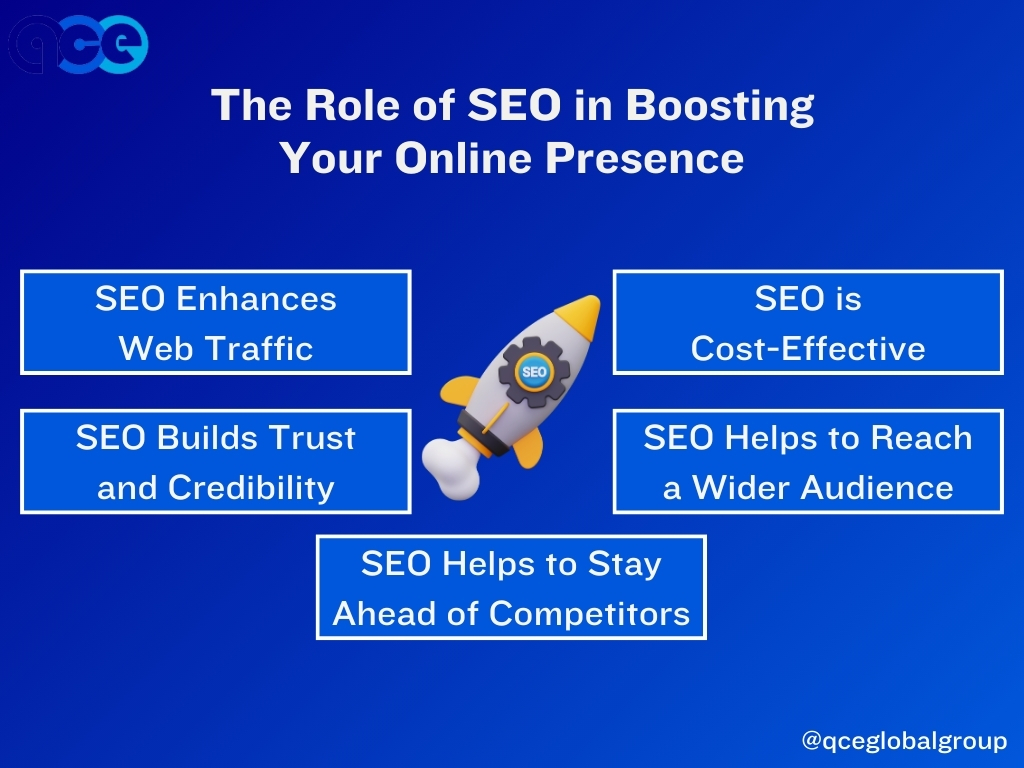
Search Engine Optimization (SEO) plays a significant role in enhancing your online visibility by ensuring that your website appears at the top of search engine result pages (SERPs). It makes use of various elements such as keywords, tags, meta descriptions, and others to optimize website content. When these components are effectively utilized, they make your website more noticeable and attractive to search engine algorithms, which in turn, rank your website higher on SERPs. A higher ranking increases your website’s visibility and accessibility to potential customers, thereby enhancing your business’s online presence.
- SEO Enhances Web Traffic: SEO helps to improve the quality and quantity of traffic to your website through organic search engine results. The higher your website ranks on SERPs, the more likely it is to be seen and visited by potential customers.
- SEO Improves User Experience: SEO is not just about keywords and meta tags. It also involves improving the overall user experience on your website. This includes creating high-quality, relevant content, making your website easy to navigate, and ensuring it loads quickly and correctly on all devices.
- SEO Builds Trust and Credibility: A website that ranks high on SERPs is more likely to be viewed as trustworthy and credible by users. SEO involves implementing strategies that help to establish your brand’s authority online, such as obtaining backlinks from reputable websites, providing accurate and up-to-date information, and maintaining a professional, user-friendly website.
- SEO is Cost-Effective: Unlike paid advertising, SEO offers long-term results and a higher return on investment. Once your website is properly optimized, it will continue to rank high on SERPs and attract organic traffic, even without ongoing advertising expenses.
- SEO Helps to Reach a Wider Audience: With SEO, you can target specific demographics and reach a wider audience. By optimizing your website for keywords that are relevant to your target audience, you can increase your chances of reaching potential customers who are actively searching for your products or services online.
- SEO Increases Conversion Rates: SEO not only helps to increase traffic to your website but also improves the chances of this traffic converting into sales. A well-optimized website is more likely to attract users who are ready to purchase, thereby increasing your conversion rates.
- SEO is Quantifiable: Unlike traditional marketing methods, SEO provides measurable results. With tools like Google Analytics, you can track your website’s performance, understand what strategies are working, and make informed decisions to improve your SEO efforts.
- SEO Helps to Stay Ahead of Competitors: If your competitors are using SEO and you’re not, you’re likely to fall behind. A strong SEO strategy can help you stay ahead of your competitors by ensuring that your website ranks higher on SERPs.
- SEO Improves Local Search: With the rise of mobile search, local SEO has become increasingly important. SEO can help to optimize your website for local search, making it easier for customers in your local area to find and visit your business.
- SEO is Constantly Evolving: The world of SEO is always changing, with search engine algorithms constantly being updated. Staying up-to-date with these changes and adjusting your SEO strategy accordingly can help to maintain your website’s high ranking and online visibility.
Leveraging Influencer and Affiliate Marketing for Greater Exposure
Leveraging influencer and affiliate marketing can greatly enhance a business’s exposure and reach. Influencer marketing offers an opportunity to tap into the vast audiences of influential individuals on social media. Through a strategic partnership, these influencers promote a brand or product to their followers, providing a level of authenticity and trustworthiness that traditional advertising mediums often lack. On the other hand, affiliate marketing allows businesses to collaborate with other companies that refer their customers or clients back to the original business. This symbiotic relationship not only provides increased visibility but also drives targeted traffic, leading to potential conversions. Both these strategies offer cost-effective solutions for businesses to extend their reach and visibility.
Here are the 10 Strategies for Leveraging Influencer and Affiliate Marketing for Greater Business Exposure:
- Collaborate with Influencers in Niche Markets: Identify influencers who have a strong presence in the industry related to your product or service. This can create a more targeted and engaged audience.
- Implement Affiliate Programs: Allow other businesses to earn a commission by promoting your products or services. This can increase product visibility and drive traffic to your site.
- Content Creation Partnerships: Work with influencers to create unique and compelling content that showcases your product or service. This can include blog posts, videos, or social media posts.
- Co-branded Campaigns: Partner with influencers or other businesses to create a co-branded marketing campaign, which can increase exposure and credibility.
- Influencer or Affiliate Discount Codes: Offer a unique discount code for each influencer or affiliate, encouraging their followers to purchase your product or service.
- Product Reviews: Have influencers or affiliates review your products or services and share their experiences with their audience.
- Host Giveaways: Collaborating with influencers or affiliates to host giveaways can increase engagement and visibility.
- Sponsor Influencer Content: Sponsor an influencer’s content to reach a wider audience and gain increased exposure.
- Affiliate Events: Organize events where affiliates can learn more about your products or services, offering them incentives to promote your business.
- Influencer and Affiliate Training Programs: Provide influencers and affiliates with training about your product or service to ensure they can effectively promote your brand.
Final Thoughts: Implementing These Strategies for Your Startup’s Success
In conclusion, creating a successful marketing strategy involves understanding your customers, defining clear objectives, leveraging various channels and tactics effectively. From identifying your target market to building a unique brand image and leveraging the power of social media and content marketing – each step plays an integral role in ensuring startup success. Always remember – marketing is not just about selling products or services; it’s about telling a story that resonates with consumers. When done right, it can be the key that unlocks long-term growth and sustainability for any startup.
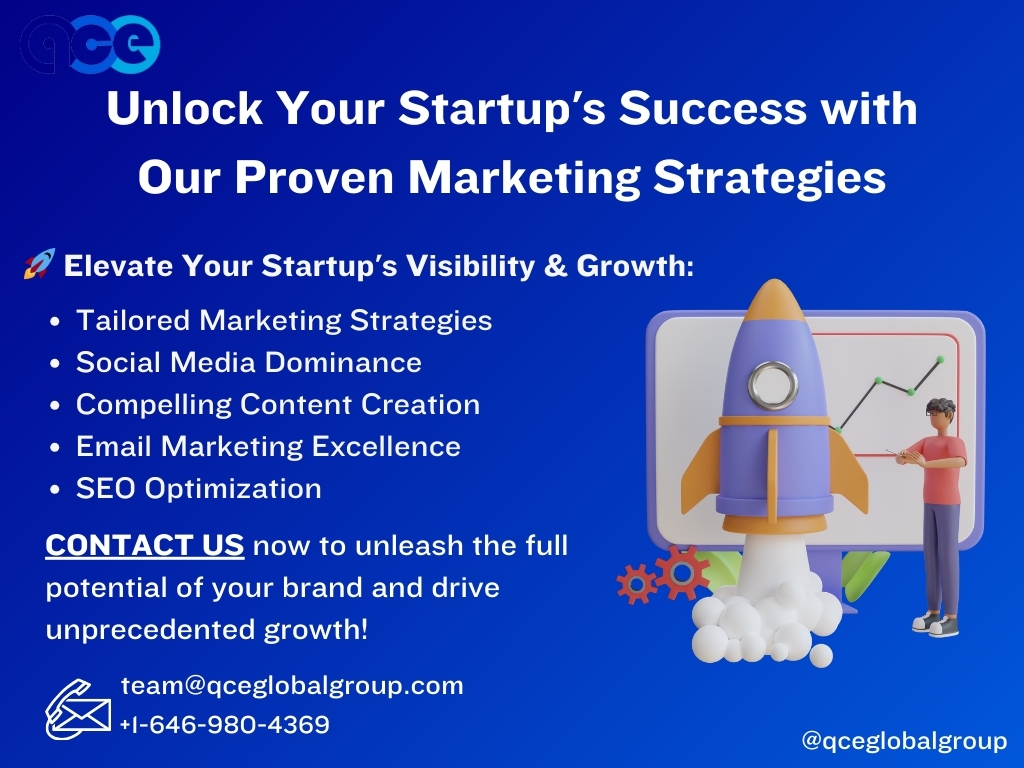
Remember, your marketing strategy isn’t just a roadmap to sales—it’s a story that connects with your audience. So, what’s your story? Start telling it today, and watch your startup thrive.
Contact us now and let’s take the first step towards your startup’s success together.



